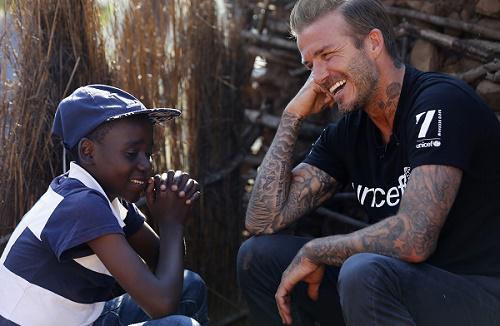
UNICEF Goodwill Ambassador David Beckham travelled to Swaziland this week to see how 7: The David Beckham UNICEF Fundis helping UNICEF to support and protect HIV-positive children. During his visit Beckham heard and saw how the worst drought in decades - now taking hold of vast swathes of Eastern and Southern Africa - is threatening to wreak havoc on the lives of children and families already made vulnerable by HIV.
During his visit to Swaziland, the country with the highest rates of HIV infection in the world, Beckham met mothers and children who are living with HIV in some of the poorest homesteads in Lubombo and Shiselweni regions. He saw how his fund is helping UNICEF to provide children with life-saving treatment and care and learned how over the next three years the 7 Fund is committed to contributing 27% of UNICEF Swaziland’s annual budget for HIV/AIDS.
UNICEF Goodwill Ambassador David Beckham: “Last year I launched my own Fund with UNICEF because I wanted to help build a safer world for children. I feel very proud to be in Swaziland to see how the money raised through the 7 Fund is helping to keep vulnerable children affected by HIV and AIDS healthy and safe. Many of the children I met, some of whom were the same age as my own children, had lost one or both parents to AIDS and are themselves now living with HIV. As a father of four, it was hard to hear their stories about the daily challenges they face, which are now being made so much worse by this devastating drought.”
Beckham continued: “Children who are already incredibly vulnerable because of HIV are now at risk from a new crisis that could have a devastating impact on their lives. Across Eastern and Southern Africa millions of children are at risk from hunger, water shortages and disease. I am speaking out for these children to make sure they are not forgotten at a time when they so desperately need our help. I am urging the global community to do all it can to help UNICEF deliver the life-saving food, medicine and clean water that these children so desperately need.”
A series of climatic shocks in 2014 and 2015 ruined harvests and depleted water sources, with one of the most powerful El Niño weather events in 50 years exacerbating drought across the region. The scale of the current crisis is unprecedented with food crises happening in tandem across 10 countries in the region, affecting some 26 million children.
UNICEF is working with governments and partners across Eastern and Southern Africa to reduce the impact of the drought and to provide life-saving humanitarian assistance, but urgently needs US$226 million in 2016. Currently, humanitarian aid is not keeping pace with the tremendous needs of children, with appeals across Eastern and Southern Africa less than half funded.
“This drought – the worst in 35 years - is increasing vulnerabilities for children across the region, putting millions of lives and livelihoods in jeopardy,” said Leila Gharagozloo-Pakkala, UNICEF Regional Director for Eastern and Southern Africa. “Nowhere is this more apparent than in HIV-affected communities across Southern Africa, the global epicentre of the AIDS pandemic. People living with HIV are extremely vulnerable to food insecurity, malnutrition and income shocks. If we are to protect the huge gains we have made on HIV prevention and treatment across the region, then it is imperative that the international community urgently comes forward to limit the effects that this entrenched drought is having on many of the continent’s children and families.”
Latest figures show:
- 31.6 million people, including 16 million children, will require food aid in 2016 across southern Africa;
- 19.5 million people, including 10.5 million children, will need food assistance this year in eastern Africa; Ethiopia alone has 10.2 million people affected, including near on 6 million children;
- Over one million children across the region are being targeted for severe acute malnutrition treatment this year, with cases doubling in Angola, Malawi and Zimbabwe when comparing figures from 2015.
In 2015 Beckham marked his tenth anniversary as a UNICEF Goodwill Ambassador by launching 7: The David Beckham UNICEF Fund and made a commitment to speak out and raise vital funds to protect some of the world’s most vulnerable children. The Fund is helping UNICEF deliver life-changing programmes for children across the world, including those affected by HIV in Swaziland.
Source: UNICEF
 FR
FR EN
EN AR
AR








